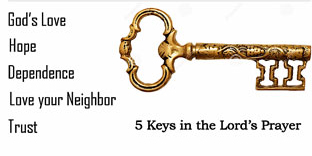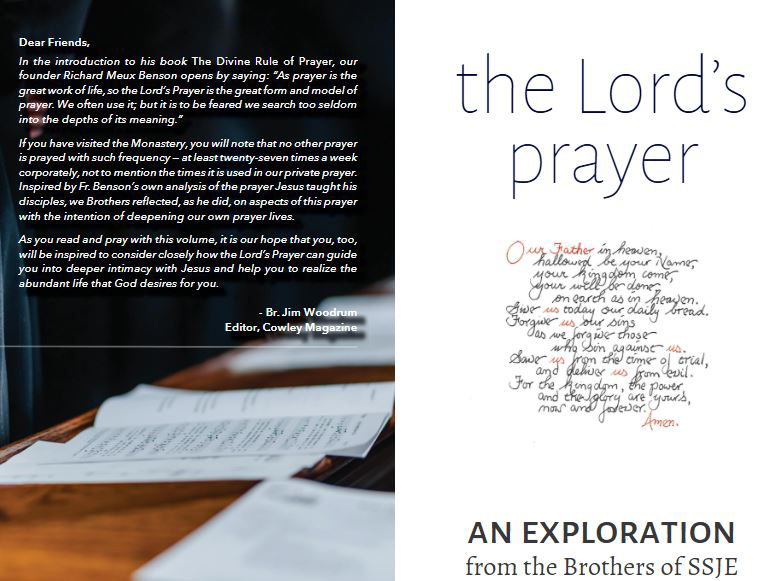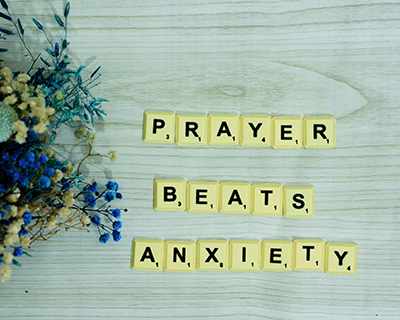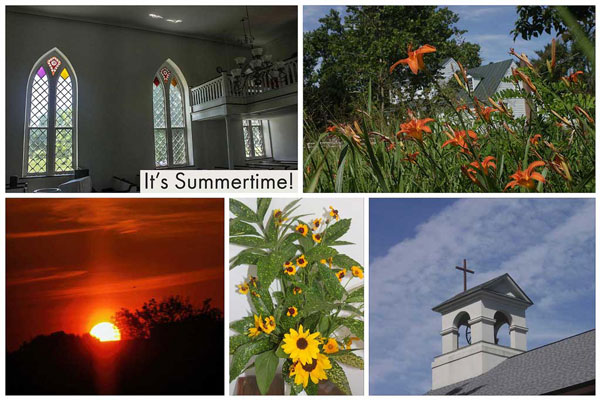Click here to view in a new window.
2025 Sun July 27
5 Keys to the Lord’s Prayer, a 2019 sermon

“Ask and it will be given you; search and you will find; knock and the door will be opened for you.”
We have lots of locked doors in our lives. We lock our doors to protect ourselves and our possessions.
And as we grow older, we start locking the doors of our hearts too.
Sometimes we lock the doors of our hearts to keep out the people who have hurt us.
Sometimes we even lock the doors of our hearts against God, out of anger or despair, or a feeling that God didn’t hear our prayers when we prayed.
So when Jesus taught us the words of the Lords’ prayer, he gave us a set of keys to use to unlock those closed up stuffy places in our hearts.
So let’s take a look at this set of five keys in the Lord’s Prayer and see what doors they will unlock for us.
Key Number One—God’s Love.
When we pray, “Father, hallowed be your name,” we have a key to the door of the places in our hearts where we have locked out God’s love.
When we stand before this door of God’s love and unlock it and go in, it’s as if we’ve entered a whole universe of love that has been waiting there for us all along. Prayer gives us the courage to enter the space and to explore God’s love for us, and the farther we go into this space of God’s love, the more expansive the space becomes, until we realize that we can never come to the end of God’s love, but that the more we search, the more we will find.
Key Number Two—Hope.
We have locked up a great deal of our hearts to hope. When we find ourselves saying, “Whatever,” “That’s just the way it is,” or “I can’t do anything about that so I’m going to ignore it,” or my mother’s favorite, said in either a discouraged or horrified voice, “This world is falling apart!” we have opened ourselves up to despair, by locking out hope.
When we pray these words, “Your kingdom come,” we unlock the door of Hope. When we work up the courage to enter that space of hope, we remember all that God has promised about God’s kingdom becoming a reality here on earth.
Suddenly, we see what we couldn’t see before, like Abraham, who looked up into the sky and saw in the millions of stars the promise of God about his descendants, who would become a great and mighty nation through which all nations would be blessed. And so Abraham set out, not knowing where he was going, because he was full of hope that God would fulfill the promise.
When we enter through the unlocked door into Hope, we see, in the midst of the reality of life around us, with its violence and discord and disorder, the heavenly city described in the book of Revelation coming down out of heaven, a city with God at the center, with the river of life giving water flowing through the center of the city, lined with the fruit trees with their leaves for the healing of the nations.
We can imagine this world where children have enough to eat and clean water to drink, where people have safe places to live and meaningful work to do, where walls that separate are unnecessary, where prisons are unnecessary because violence has ended, and where everyone works for and desires the common good for everyone else, a world where people value God’s creation rather than to exploit it for their own gain.
If we unlock the door to the hope that is waiting in our hearts, we can see that already this heavenly way of living is becoming a reality,
and that the dirt or the asphalt that we trudge along sparkles with the golden flecks that will someday turn to those streets of pure gold that we’ve heard described in the book of Revelation. We can’t help but rejoice and walk with a hopeful spring in our steps. When we live in hope, we know that God will keep God’s promises and God’s kingdom will once more be realized on this earth, full of life, light, and brilliance.
Key Number Three—Dependence
When we pray, “Give us each day our daily bread,” we unlock the door to remembering our dependence on God. People who live from day to day, like people I met last summer in Guatemala, literally live each day hoping to make enough money to buy the food they need to eat that night. Daily bread is just that—bread for that day only.
We treasure our independence, our delusion that we have all we have sheerly through our own efforts, our own power, or our own abilities and that we can store up all we need to last our lifetimes so that we won’t become dependent on anyone else, even in our old age.
But when we remember to unlock the door to our dependence on God, we enter a place of power far beyond the slight power of our own independence. God fills us with a power we cannot have on our own, summed up in that verse from Ephesians that I love so much, “Glory to God, whose power working in us, can do infinitely more than we can ask or even imagine.”
Key Number Four—Love your Neighbor
When we pray “Forgive us our sins, for we ourselves forgive everyone indebted to us,” we unlock the doors to the spaces in our hearts where we hold grudges, where we ignore those in need or worse yet, blame their need on them. This space of unforgiveness can fill up in a hurry as people annoy us, hurt us, take from us—we tend to just shove them all in this space of unforgiveness and throw away the key!
But Jesus gives us the key to open that locked door and to release all that we’ve crammed in, to forgive, and to clear out that space so that God’s love can come pouring in, freeing us to love instead of to resent or hate or ignore our neighbor.
Key Number Five—Trust
When we pray, “Do not bring us to the time of trial,” we unlock the door that opens into trust for God, the God we love, the God who gives us hope, the God we depend on, the God who gives us the ability to forgive. Along with the psalmist who wrote today’s psalm, we trust God to protect us, to increase our strength, to keep us safe in the midst of trouble. We trust that God is with us, and that God will never abandon us, even in sickness and in death.
When we unlock the door to trust in God, the door we may have slammed shut years ago when we went through a time of trial and forgot that God was there, in this space of trust we now remember—God is with us, especially in our troubles and distress.
God, help us to remember that you are with us, even when we are going through the trials and temptations of this life.
We’ve examined all the keys on this key ring.
Father, hallowed be your name. God’s love.
Your kingdom come. Hope.
Give us each day our daily bread. Dependence.
And forgive us our sins, for we ourselves forgive everyone indebted to us. Love your neighbor.
And do not bring us to the time of trial. Trust.
God gives us keys to help us open the doors we have locked.
And prayer is that key which unlocks our hearts to God.
Lectionary Pentecost 7, July 27
I. Theme – Relating to God with Boldness and Persistence

“Enriched Bread” – Corita Kent
The lectionary readings are here or individually:
First Reading – Genesis 18:20-32
Psalm – Psalm 138
Epistle – Colossians 2:6-15, (16-19)
Gospel – Luke 11:1-13
Today’s readings encourage us to relate to God with boldness and persistence. The gospel today, Luke 11:1-13, is a collection of Jesus’ sayings about prayer. So the first reading is the story of Abraham’s intercession with God on behalf of some innocent potential victims who live in Sodom. The psalmist gives thanks for God’s strong hand in a time of trouble. Paul warns the Colossians not to exchange the lordship of Christ for human teachings. Jesus teaches his disciples how to pray and illustrates the right attitudes with a story. The readings also present the many faces of God – as challenger, restorer, enemy, parent, and transformer.
The scriptures of the Judeo-Christian faith fully reveal the true character of God. The passage from Genesis is one of the most sublime revelations of the nature of God in the Bible. The extraordinary dialogue between Abraham and God teaches us two vital lessons: first, that God hears the prayers of those whose hearts are in tune with God’s; secondly, that God’s readiness to pardon is an integral factor in God’s justice.
Abraham’s boldness in challenging God came from his firm conviction that the lord could not act contrary to perfect justice by destroying the righteous indiscriminately with the wicked. “Shall not the judge of all earth do right?” This certain and lofty conception of the character of God still has not been fully grasped. For centuries, human societies have continued to truncate and pervert the biblical concept of divine justice, and very often human justice is untempered by mercy.
Abraham’s controversy with God also revealed the noble character of this patriarch whose name means “friend of God.” Abraham went to God in prayer with a conflict in his heart. His own sense of justice—“will you sweep away the righteous with the wicked?”—stood against his belief that the wicked must pay the penalty for their wickedness. Here, in Abraham, we see the intimations of God’s own dilemma with human creatures. In Christ we see the solution God provided.
God’s justice and righteousness were brought to bear upon sinful humanity through Jesus. Through Jesus, sinners are granted fullness of life with God as if they were perfectly righteous. The bond of wickedness was cancelled and set aside, nailed to the cross.
Punishment is our understanding of the consequences of our own actions when they don’t work out for us. It feels like God has abandoned us. Rather, God has not abandoned us, but the false god that said if we were good enough good things would happen. Instead, Jesus tells us that God sends rain to the righteous and the unrighteous. But what happens to those who are faithful is that we experience God’s restoration as justice—God brings down the high and raises up the low, as in the Magnificat.
In the gospel passage, Jesus intends to make only one point in his story about the midnight caller. If we, who are not good, know how to respond to a reasonable or good request, how much more will God fulfill requests that are borne to God in earnest prayer.
Many great devotional teachers have offered guidance in the art of prayer. One thing they all seem to agree on is that we should not give up praying for something until we either receive it or it is made clear that it is not God’s will to grant it. “Praying through” requires more patience than most of us can maintain. We blur our petitions in haste, flitting from this to that, dissipating our energy and concentration. How can we expect God to deal with a list of supplications that lightly changes from day to day?
When we call, God will answer, but we must sincerely ask, seek and knock, until heaven opens in one way or another.
Focus on the Lord’s Prayer – Matthew vs. Luke
Lord’s Prayer – Matthew vs. Luke

|
The prayer as it occurs in Matthew 6:9–13 |
The prayer as it occurs in Luke 11:2–4 |
|
Our Father in heaven, |
Father, |
|
hallowed be your name. |
hallowed be your name. |
|
Your kingdom come, |
Your kingdom come. |
|
your will be done, |
. |
|
on earth, as it is in heaven. |
. |
|
Give us this day our daily bread, |
Give us each day our daily bread, |
|
and forgive us our debts, |
and forgive us our sins |
|
as we also have forgiven our debtors. |
for we ourselves forgive everyone who is indebted to us. |
|
And lead us not into temptation, |
And lead us not into temptation |
|
but deliver us from evil. |
|
The Lord’s Prayer – from SSJE

Click here for the Lord’s Prayer from Cowley Magazine
The Monastic group in Boston, The Society of Saint John the Evangelist, published this look into the Lord’s Prayer in early 2023.
Lord’s Prayer in Luke Chapter 11
Another famous story from Luke. The Gospel reading is here.

""The Lord’s Prayer" -Psalter (2008)
The irony about Ordinary Time is that it is anything but ordinary. In the heat of the summer doldrums, the lectionary lights up with teaching moments – sending out of the 70, the parable of the Good Samaritan and the story of Mary and Martha. Connecting all are ideas of hospitality, anxiety and the “fatherhood” of God. The latter is explored this week.
The Lord’s Prayer is both in Matthew and Luke. Luke’s version is probably older since it is shorter. There are also a few differences in word choice (“sin” instead of “debt/trespass,” for example).
Luke has a greater emphasis on prayer than the other gospels. -Jesus is praying at his baptism before heavens open (3:21) -Jesus spends the night praying to God before selecting the twelve (6:12) -Jesus is praying before he asks the disciples, "Who do the crowds/you say that I am?" (9:18) -Jesus is praying on the mountain before the transfiguration. (9:28, 29) -Jesus is praying before the disciples ask him to teach them to pray. (11:1).
It may be that Luke was writing to a group of people unfamiliar with Christian/Jewish prayer, so he emphasizes the importance of prayer as he moves among the gentiles.
The contexts for the Lord’s Prayer in Luke and Matthew are quite different. The audience in Matthew (6:5-15) seems to know about praying. Jesus says, "When you are praying,…" They seem to know how to pray and the importance of prayer, but they need further instructions about prayer. In Luke, the audience, (including the disciples) doesn’t know how to pray (at least as Jesus’ followers).
The disciples (and Luke’s readers?) ask Jesus to teach them to pray.
There is a reference to John the Baptist. John’s disciples were known for certain practices, such as prayer and fasting (5:33). These practices served as markers for their identity as John’s followers. Jesus prayer also puts an identity on us as Christians. The prayer is intended to be communal, rather than personal. Note also the plural pronouns in the prayer: "our" and "us." The Lord’s Prayer is a list of those "good gifts", gifts we may ask of God in the sure knowledge that they are ours in the asking.
Clift Notes version – “God is Holy. Ask for God’s kingdom – reign over all things to become a reality in your life and in your world. Live simply; one day at a time. Stay humble and ask pardon for your wrongdoings. Offer pardon to others just as you want that for yourselves and ask for help to stay out of trouble. When you live with these things uppermost in your life, you will begin to live in God’s kingdom with the help of the Holy Spirit to help you”
There are five key words in the prayer 1. Relationship 2. Hope 3 Nourishment 4 Reconciliation, 5 Peace
Why Prayer is Important ?

“Give us Today our Daily Bread” -James Hook (1866)
Michael Foss (Power Surge) lists “daily prayer” as “The first mark of a disciple.”
From Yearning Minds and Burning Hearts: Understanding the Spirituality of Jesus by Glandion Carney , William Rudolf Long
“’Prayer changes us.’” The ultimate value of prayer is that it opens us to understand God and the world in fresh ways. Prayer gives us new spectacles to see the world–glasses that put the seemingly huge demands of contemporary life in a new perspective. Prayer helps us listen to the voice of God, accept the will of God and ask for the good things of God
“The practice of prayer is a standing rebuke to the wisdom of the world. The practice of prayer affirms a dimension to life that is unseen and unmeasurable, while the wisdom of the world considers something important only if it is visible and quantifiable. The practice of prayer proclaims that people are spiritual beings, rooted in the heart, while the wisdom of the world assumes that we are economic beings, concerned primarily with our personal net worth and an adequate retirement income. The practice of prayer indicates that God is the watcher, guide and protector of our lives, while the wisdom of the world teaches that unless we stand up for ourselves, no one will. The practice of prayer proves that “nothing will be impossible with God” (Luke 1:37), while the wisdom of the world says we need all the resources ahead of time and all the right people speaking up for us or we will not be able to get what we want out of life. The practice of prayer says, “Don’t worry.” The wisdom of the world says, “Calculate.”
“Prayer is one of the principal ways of enlarging our awareness of God and of the universe. Prayer assumes there is more to the world than we can experience with our five senses. The great diversity of living things in the world should not only increase our sense of wonder, but also give us an awareness of our human limitations
“Prayer is the unique opportunity which God gives us to develop a deeper understanding of God and of the world
The latter is emphasized here -“Prayer is meaningless unless it is subversive, unless it seeks to overthrow and to ruin the pyramids of callousness, hatred, opportunism, falsehoods.” Abraham Joshua Heschel (1907-1972).
Three Characteristics of Prayer
“What is the essential nature of prayer? First, prayer is the door or threshold to the spiritual world where God dwells in unapproachable light. It is the door to the inner world of the heart, whose contours have never fully been mapped. Prayer is the means to a “cartography of the soul,” to a process of spiritual mapmaking. When we pray, we pursue Jesus into the deep things of life, where light and darkness dwell together and neither fully extinguishes the other. Prayer is the door into understanding the heavenly realms as well as the inky abyss. It opens new realms to us.
“Prayer is also the anchor of our lives. It not only opens new vistas into the spiritual life, but also ties us ever more firmly to God in the process. One summer during college I worked at a large office building in San Francisco next to where a skyscraper was being built. It took the crew weeks just to drive the pilings deep into the ground. I still remember the ear-splitting crashes of hammers, the rush of pressurized air and the shouts of workers. They were anchoring the building, now among the tallest in San Francisco, deep into the bowels of the earth so that not even a major earthquake would topple it. Prayer is like that. It anchors us to God by blasting through the layers of debris and dirt of our lives so we might have a sturdy and strong life.
Prayer is, finally, a process of working the earth of the hearth, as the ancient monastic writers might say. In her book The Closter Walk, author Kathleen Norris writes about the ways that the Catholic monastic tradition provides a rhythm and depth for spirituality that many Protestants have never explored. When she says that the life of prayer works “the earth of the heart,” she means that prayer is like the act of cultivation. In order to work the soil, one must break up the hardened dirt clods, water the ground, free it from weeds and then plant a crop. Prayer is the way to “loosen up” the heart. During the natural course of our lives the “earth of our hearts” becomes parched, weed-infested and hard as flint. Unless we take care to break it up to run our fingers again through the rich soil that we know is there, our lives become as destitute and as desiccated as a desert.
Prayer is the means Jesus used to open himself to God, to anchor himself to his Father and to work the earth of his heart. Jesus prayed often and taught his disciples to pray. Prayer was as necessary to him as the air he breathed. I believe it was prayer that gave Jesus his powerful sense of awareness and insight into people and the world. It connected him to God, the source of life, and he began to see things so much from the divine perspective that he had no doubt that his work was God’s work. The practice of prayer gave Jesus an intuitive grasp of the truths of life as well as the political and religious realities around him. He could, figuratively speaking, see into another person’s heart because he knew both his own heart and the heart of God
“… We should, rather, yearn to imitate him and develop a similar commitment to prayer for ourselves. We should look at Jesus’ life as testimony to the benefits of developing a life of prayer. Jesus invites us, through prayer, to experience new, fresh, deep, true and permanent insights into the nature of God, the world and the culture in which we live.
Butterflies in July

The 6 Parts of the “Lord’s Prayer”

Notes come from the book The Lord’s Prayer The Meaning and Power of the Prayer Jesus Taught by Rev. Adam Hamlton. This is an exploration of each of the parts of the Lord’s Prayer.
Hamilton writes “I am convinced that this prayer summarizes so much that was essential to Jesus, and praying it daily has the power to change our lives.”
He suggests how to get the most of it. “Over the course of a week, while you pray it, focus on one of the phrases to meditate upon. In six days you will have covered its six petitions. On Sunday simply pray the entire prayer in worship without a particular emphasis.”
- Our Father, Who Art in Heaven, Hallowed Be Thy Name
“Our Father” Prayer is not directed just to me but us. Christianity is not meant to be lived alone, but in community. Our prayers are prayed with others and for others. God is Father to us all, all nations and people. God is the pattern and example of what a father is meant to be; that is, one who is steadfast, faithful, loving, kind, compassionate, merciful, and present. We are not orphans, no matter if our earthly father is dead
“Who Art in Heaven”
Heaven is distinct from earth, the material world, and yet it envelops both. We are surrounded by heaven. Heaven isn’t always “up there” or “out there” in Scripture; it is also all that is around us even though we can’t see it. In this sense, God is as near as the air that we breath.
For Jesus, “heaven” is most often used to represent God’s reign, the world as it was meant to be. While it might include all that is below, heaven most often seems to indicate the realm where God’s will is done, where injustice, poverty, cruelty, inhumanity, violence, corruption, and pain have been banished
“Hallowed Be Thy Name”
This is a petition or request for God to act. Hallow something is holy. To be hallowed or holy is be set apart for God and for God’s purposes. Hallow can also mean pure, or that which is wholly different from the ordinary. It can signify something or someone that is cleansed, purified, righteous, or utterly good. Finally, it can mean “revered or something that inspires awe”. I
In the Lord’s prayer, we are asking God to hallow or make holy God’s name in reputation. When we pray, we fix our heart on the things we pray for, and we invite God to work through us and others to answer our prayers. We hallow God’s name by living in a way that reflects God’s goodness, majesty, beauty, and love. All creation is meant to hallow God’s name, to bring God glory and honor. We ask God to help us love others with your low and keep God’s name holy.”
Recent Articles, Pentecost 7, July 27, 2025

“Summer at St. Peter’s”
 Pentecost 7 – The Lord’s Prayer
Pentecost 7 – The Lord’s Prayer
Lectionary, Pentecost 7
Commentary, Pentecost 7
The Gospel in July, 2025
These texts affirm that God listens, responds, and draws near to those who seek with faithful hearts. This is great assurance! In Genesis 18:20–32, Abraham persistently intercedes for Sodom, revealing God’s openness to dialogue and mercy after God was ready to strike them down. Psalm 138 responds with thanksgiving for God’s nearness affirming that God hears when we call. In Colossians 2:6–19, Paul proclaims that through Christ’s death and resurrection, believers are rooted in grace and set free from spiritual powers—making divine access not only possible but secure. Finally, Luke 11:1–13 reinforces this relationship through Jesus’ teaching on prayer: God is not distant but like a generous parent, ready to give the Holy Spirit to those who ask.
Focus on the Lord’s Prayer
Why Prayer is Important ?
Lord’s Prayer – Matthew and Luke
The Lord’s Prayer – from SSJE
5 Keys to the Lord’s Prayer, 2019 sermon
Lord’s Prayer in Luke, Chapter 11
The 6 Parts of the Lord’s Prayer
Butterflies in July
Sunday Links, Pentecost 7, July 27, 2025
